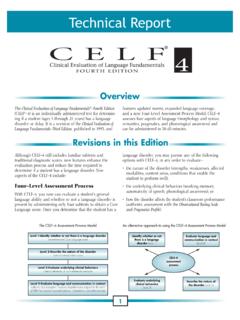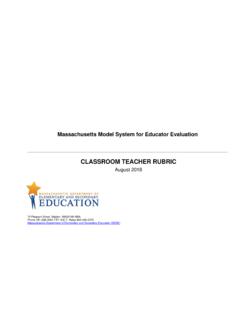Transcription of Literacy Learner Case Study 1: Elementary
1 Emily Turner TE 846 31 July 2007 Literacy Learner case Study 1: Elementary Student Description Caleb is a seven year old boy who has finished first grade and will be entering the second at a parochial Catholic school in Lansing, Michigan. Caleb is a native English speaker; his mother is a secondary school teacher in the local public school system with a Bachelor s Degree, and his father is a high school graduate. His parents describe Caleb as a bright child, a strong reader and thinker, but a bit behind in emotional maturity and socialization.
2 Though he had many friends and is well liked by his teacher, Caleb has had some problems in the classroom with anger and frustration (refusal to do tasks, obstinacy toward teachers and parent volunteers, silliness and class disruptions, crying, yelling, etc.) and has had to be removed to the principal s office on several occasions to calm down and to reduce disruptions to the goings-on of the class. On his report cards, Caleb has consistently been marked satisfactory plus in reading, vocabulary, and comprehension. He has been marked needs improvement in handwriting and following instructions .
3 I chose Caleb for this case Study because through assessment, analysis and reflection, I was hoping to see if Caleb s strengths and challenges as a Literacy Learner might correlate to times when his frustration and anger level are peaked. Through analysis of assessment, I was interested to see if there are types of lessons that can address his challenges and help him to improve in the areas in which he struggles. Because his parents described him as a strong reader, I was also interested in assessing his strengths as a Literacy Learner and creating lessons to challenge him further, fostering a feeling of success in the classroom.
4 Individual Motivation Differences The first time I met with Caleb, we discussed the purpose of our meetings and he asked many questions. I answered his questions honestly; he seemed to want to know that I wasn t judging him. I explained that he was helping me with my schoolwork, and if he let me, I could help him with his. It was important to me that I build trust and openness between us; I wanted Caleb to feel safe and supported to encourage him to work cooperatively with me and be motivated to work independently as well (Standard IV). Since Standard III includes knowledge of Literacy learners interests and values to better develop engaging learning experiences, I thought that a good way to start our work together would be to conduct some interest assessments; this would help him to understand that our focus was reading and writing, while helping me to find out about his interests (to better choose reading material and writing topics) and to gauge his feelings toward different aspects of Literacy learning.
5 Subtopic 1: Reading Interest I administered the Elementary Reading Attitude Survey (Appendix: Artifact 1) first and we talked about many of his answers. I noticed that his responses were very positive overall (excited or pleased) when he had autonomy over the types of reading material he read and when he could read, but on the negative side (bored or frustrated) when faced with reading things not of his own choice or during structured school time. He replied that he enjoyed reading books during free time at school, reading for fun at home, going to the bookstore, reading different kinds of books, and using the dictionary ( I like looking up new words ).
6 He stated that he likes learning from books, but qualified his answer by stating, not from school books from Eyewitness books and stuff about how things work. His responses for most questions about reading at school were mostly bored , and he answered angry or frustrated when asked about his feelings about reading from his reading books at school (Ribbons or Mr. Fig) stating that the comprehension questions were too easy and that was for babies. Caleb s responses to the reading interest inventory were consistent and clear. Because his attitude toward reading in general was positive, but responses about reading at school were for the most part negative, I started to think that Caleb s reading level might be above what he was expected to read in the classroom and therefore unchallenging what he would call for babies.
7 In fact, one of the only positive responses he gave about reading required material at school was about taking reading tests something that he excelled at and therefore felt good about. Based on this information, it would then be important to assess Caleb s phonological awareness , structural analysis for reading, reading fluency, vocabulary and reading comprehension in order to ascertain his reading level compared with the reading level of the materials assigned at school. Much of his frustration may be stemming from being unchallenged during these lessons in the classroom.
8 It is important to note that Caleb is close to satisfying the Grade Level Content Expectations for Reading Attitude (2nd grade) he is enthusiastic about reading and does substantial reading on his own, but has yet to develop this enthusiasm in school as much as at home. Subtopic 2: Writing Interest I administered The Parallel Bar writing interest survey (Appendix: Artifact 2) to Caleb during our first meeting as well. Again, his responses were overwhelmingly positive about writing in diverse genres and about various topics of his own choice. In fact, he answered only six of the twenty-eight questions negatively, and sixteen of the twenty-two positive answers were at the highest end of the scale (excited).
9 Three of the negative answers centered around school-based writing, such as writing about something he did in science or social studies (boring), or the prospect of writing more in school (frustrated/angry). The other three negative answers had to do with keeping a diary and writing about events in his life (boring), and writing a story instead of watching TV (frustrated/angry). Though Caleb s overall attitude toward writing seemed to be good, he stated many times that it depends on whether or not he can choose what he writes about and when. For example, he was excited by the idea of writing a journal for class, but much less enthusiastic if the teacher decided upon the topic.
10 In talking with Caleb s parents, I found out that he had had many frustrated episodes during journal time in the morning (an every day activity), and that he often rushed through it to get to free time, which was scheduled directly afterward. His teacher insisted he complete the assignment each time, and that he redo it if it was not up to standards. This is when much of the obstinacy occurred. Along with assessing reading level and ability, looking at Caleb s writing skills was important as well. Comparing these results with his interest surveys might give me a better understanding of how his ability and interest affect his academic and emotional response to writing.


